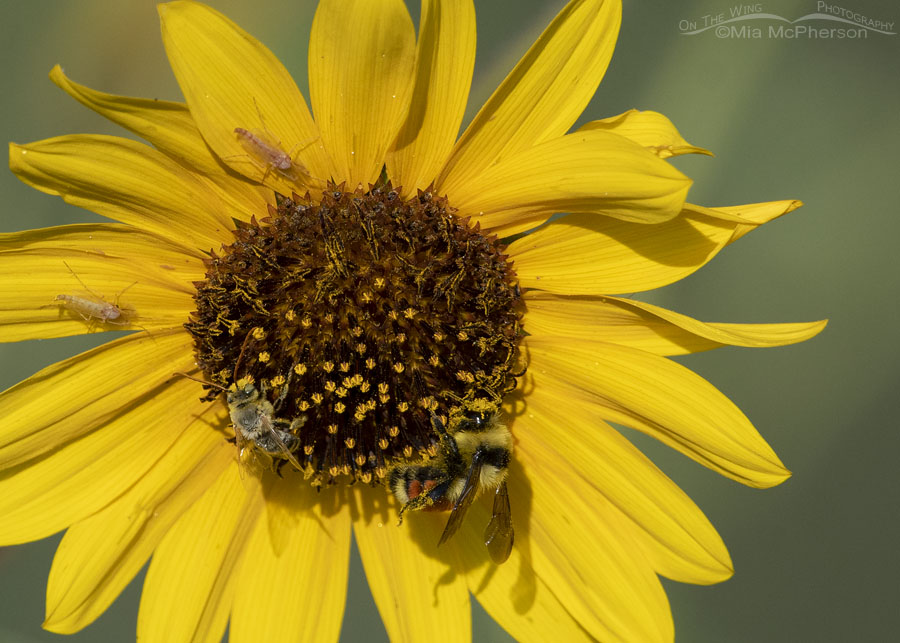 Great Basin Bumble Bee (R) and Long-horned Bee (L) on a Common Sunflower plus two Midges
Great Basin Bumble Bee (R) and Long-horned Bee (L) on a Common Sunflower plus two Midges
May 20th is World Bee Day and I am sharing a photo of two native bees this morning. The Great Basin Bumble Bee and the Long-horned Bee. Native bees are important pollinators and without them our ecosystems would collapse.
Climate change, habitat loss and the over use and indiscriminate spraying of pesticides are putting many native bee species at risk.
One clump of Common Sunflowers may attract and feed many different species of native bees while they are in bloom. Sadly the clump of native sunflowers where I photographed these bees was destroyed during peak bloom just a day or so after I took this photo. For no reason whatsoever. Once they were cut down the native bees had to look elsewhere for food. So did the other beneficial insects in the clump of sunflowers.
What makes the clump of sunflowers being cut down into pieces even sadder is that native bees usually nest only a few yards away from their food source. The heavy equipment used to cut down the sunflowers may have also destroyed the nests of these native bees.
We Can Do More To Protect Native Bees
We can use native plants in our yards instead of lawns. That is better for the environment, for the bees and for us.
The indiscriminate use of pesticides kills native bees and other beneficial insects as well as the ones we consider pests.
We can provide safe nesting areas for native bees. According to thebeeconservancy.org 70% of solitary bees live underground, while 30% live in holes inside of trees or hollow stems. Species like bumble bees build their nests in undisturbed land, and you can provide safe haven for them by leaving an untouched plot of land for them in your garden.
I’m speaking for native bees because they can’t speak for themselves. We need them. They only need us to protect them.
Life is good.
Mia
Click here to see more of my insect and spider photos. Click here to see more of my flower, shrub and tree photos.
More Information on our native bees and World Bee Day:


Love the message and the pics. Thanks Mia.
Hi sweetie ! Beautiful photos! I have lots of flower but see few Honey bees here! Bumble yes and other bugs! Thank you for sharin g Love ya
🐝
Very good. I too will be sharing this post.
We do indeed need them. Which is I suspect something no other species can say about us…
Timely reminder, Mia. Thank you.
I’ve been fascinated to discover how many native bees there are! Now I actually seek them out instead of seeing one by accident on a birding trip.
Thank you for the post. I will make extra efforts to protect native bees.
I second what Dick Harlow said. I’ll be passing this on.
Thank you Mia,
I appreciate this info: “native bees usually nest only a few yards away from their food source”
Am making sure I have plenty of sunflowers, asters, and cone flowers in addition to the many goldenrods as keystones to the many flowering plants throughout the year.
Thanks for the message, greatly needed to be said and circulated!!